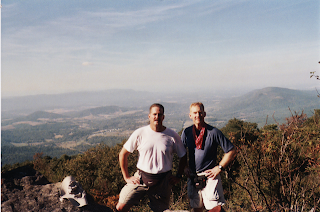Does Geology Change at the State Line? Oil and Gas Companies Want Us to Believe it Does.
I admit it. I have been a very good customer to the oil companies over the years. During the 35 years since obtaining that ticket to freedom called a “drivers license”, I have averaged about 20,000 – 30,000 miles per year behind the wheel. (The low years were those in which I spent 6 months of the year under water, not buying much at all from the petroleum companies.)

In all of that traveling on US highways, I have crossed a number of state lines. When traveling on the interstate highway system it is pretty easy recognize the line because there are great big signs – often signed by the current governor – welcoming travelers to the state. However, my wife and I also like to travel the backroads; on those, it is often quite difficult to know when one state ends and the next begins.
Geology is not my forte, so perhaps it is different when you are underground, but I suspect that state lines are just as imaginary below the surface as they are above. I have also had the opportunity to do some traveling on multi-state bodies of water like the Potomac, Shenandoah, Susquehanna, Delaware Bay and Chesapeake Bay. Once again, it is quite difficult to tell where one state ends and the next begins – though my phone’s GPS capabilities make that a bit easier these days.
The inability to tell one state from another without signs, maps or GPS devices is why I am confused when I hear the current party line of the oil and gas industry that “the states” are the appropriate regulators for their extraction and disposal activities. It is certainly not inconceivable that the impact of the activities would be felt just as strongly on the opposite side of the politically determined imaginary line when the wind shifts, the water flows and the drill bit digs a couple of miles away from the entry point. One economically challenged state may decide that drilling is fine near the border, especially if they recognize that the impacts will be shared while the revenue will not.
Our Constitution makes it quite clear that the appropriate decision authority for activities that involves balancing the interests of the various states should be the federal government. That is why we all agreed to be a union and is part of the strength of our system. It is not about putting the decisions at the hands of faceless bureaucrats in that distant boogyman-hosting city that some love to decry as “Washington, DC”. It is about moving the decision to a body that enables conflicting interests to be taken into account.
Disclosure. I was a faceless Washington, DC bureaucrat for nine years. I spent a lot of that time trying to help people understand that their seemingly local issues had much broader impact and needed a greater effort to arrive at a shared resolution than they thought.

In the US geology and seismicity has always fragmented into state boundaries. This has stopped the ability to see the larger picture. A case in point is the recent Arkansas earthquake swarm. The earthquakes stopped suddenly, like hitting a brick wall, when they stopped injecting, but it took forever to get them to stop. Will this lesson leave the state? Will they now admit it was the injection? There’s not a speck of news on this ‘miracle’ of stopped earthquakes. 🙂